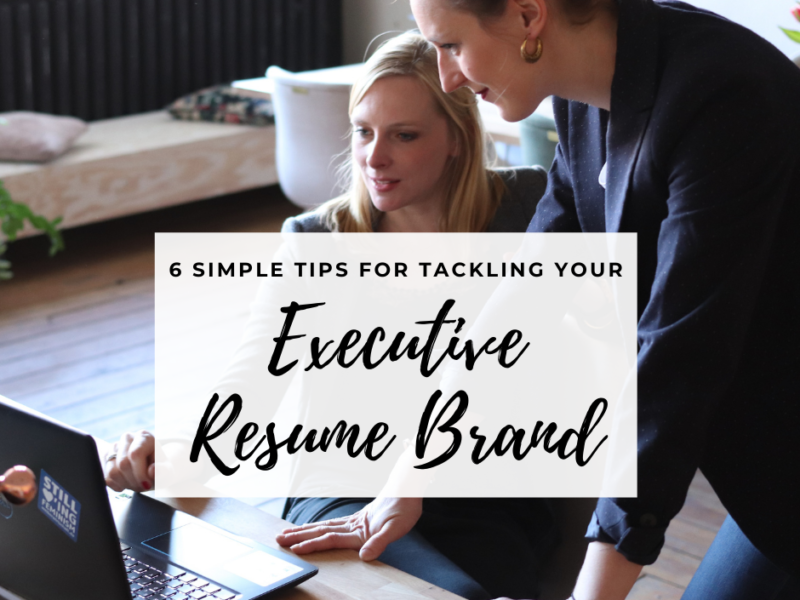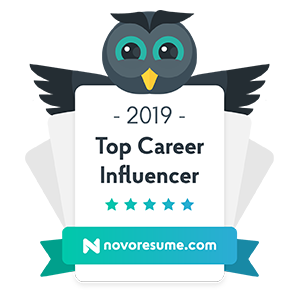Updated December 2020
Executive resume writing is more complex than just throwing your work history on a document. It requires achievement-focused branding strategy in order to stand out from the other job candidates. In this blog post we will explain how to improve your resume brand and generate more employer responses.
So you’re a business leader – a great one, for sure! You know how to establish, develop, and motivate teams. You are able to create great business strategies that generate millions in new revenue and expand the reach of the organization. You make things happen at your company. However, you struggle with the task of putting all of your great accomplishments on paper. Perhaps you haven’t touched your resume in years or maybe you have so much to say that you don’t know where to begin. Take a deep breath. I hear this over and over again from my executive clients. You’re not alone. Putting your best foot forward and highlighting each and every one of your achievements on an executive resume is entirely do-able. Here’s what you need to know.
What Makes an Executive Resume Unique
The executive market is far more competitive than the entry-level or mid-career markets. On top of it, you may be worried about age discrimination. Gone are the days of a basic work history and laundry list of bullets. As an executive, it’s important to know that without a solid, well thought-out brand, you’re not going to get far. You must have a brand that highlights your value. What is it that you bring to the organization, that’s better than the next executive? Your brand is what sells you. When you are matched up against other talented execs of equal or more experience, you need to get noticed by setting yourself apart. Your brand is how you do this.
Start with a plan
As an executive, you probably get that planning is the first part of executing any great strategy. The same goes for producing a great executive resume. Start with a plan. A great resume-writing plan starts with knowing where you want to land. Whenever I start the executive resume writing process, I have my clients find a few positions for which they are interested in applying. By the way, if you ever purchase a resume-writing service and they don’t ask for your target, be very wary. A job description helps us stay on track throughout the writing process so we can be sure we are working towards the end goal: a perfectly tailored resume.
Planning Questions You’ll Want to Consider
If you’re not sure which kinds of job descriptions to target, take a step back and explore a few questions to help with the planning process. Are you seeking a position in a larger company? A smaller company? A startup? Are you exploring a new industry? Will you be targeting a lateral move? More direct reports? These are important things to iron out as you are getting started. If this starting point isn’t clear, chances are the end product won’t be very clear either. If this is where you’re getting hung up, a career coach could be especially helpful (and time-saving) in figuring out your next target.
Create Your Executive Brand With the Big Picture in Mind
After you know where you’re going, determine what it is that you want to showcase to the hiring manager or recruiter. This will help define your new brand and ensure it’s aligned to your target. Branding is consistently important for resume writing at all career levels. However, the skills and competencies that make up your executive brand must be of higher caliber than ever before in your career. Think big picture about how you impact the entire organization – not just about tasks you’ve performed.
“I want to send a much deserved thank you. It’s been great working with you. Your service is amazing and offers exceptional value for highly professional services. In particular, the expert guidance and library of workshops in the Job Search Accelerator and your first in class resume writing service in “The Works” package were extremely helpful. I absolutely recommend NG Career Strategy. It is truly a transformative experience.” – Katy, Financial Services Executive & The Works Client
Executive Branding Questions You’ll Want to Consider
Branding isn’t for everyone (unless you’re a marketing exec of course). Here are some questions you’ll want to consider as you brainstorm around your new executive brand: Are you skilled in turning around underperforming businesses? Driving customer relationships? Have you ever been able to propel the organization into a new market that has not yet been penetrated? Tell the hiring manager about this! Bring your own brand to market! Here is some more branding advice you might find helpful as you get started. If you’re making a career pivot into a different industry, you will need to apply a career pivot branding strategy.
The Most Important Resume Real Estate
If you don’t remember anything else from this blog post, be sure to remember this: the top third of your resume is prime real estate. Short attention spans and the natural path of the eye scan make this extremely important when writing resumes. The top of the page is where you want to “brand it up” and make yourself shine!
A critical step in branding yourself is creating a strong executive summary that excites your reader and encourages him or her to read more. One of my favorite ways of doing this is by creating a tagline at the top of your resume (under name and target position) that will stand out. This is the best place to establish your brand. Follow this with a 5 to 6-line summary that tells the reader more about how you are and what you can bring to their organization.
Always Talk About Your Accomplishments
Accomplishments are key. Your resume should be written around them. As an executive, you probably have a lot of accomplishments. The tricky part is figuring out which accomplishments you want to write about. This is where your target job descriptions will help you. What is important to the company at which you are applying? Are they looking for a turnaround specialist? How about someone who can lead global expansion? Once you figured out what it is they are looking for you will want to create a key highlights section and list some of these accomplishments right up front and center.
In addition to a key highlights section, you will want accomplishments listed throughout your resume. Show these accomplishments under each role, focusing on frontloading the accomplishment with the details following. An example of this would be:
“Turnaround underperforming organization by _____.”
It’s important that your accomplishments drive the resume. Hiring managers need to be able to see what you have done for other organizations to determine what it is that you can do for them. A simple Google search and you find all kinds of great keywords and verbs to use within a resume.
If you want to be fully prepared to apply for Executive level jobs, with a keyword and ATS-optimized resume, check out our best-selling package, The Works. It covers all the bases—resume, cover letter, LinkedIn profile, and a 45-minute phone consult with one of our career strategy experts—to give you the best chance at getting hired.


 How to Write a Sales Resume That Sells
How to Write a Sales Resume That Sells


